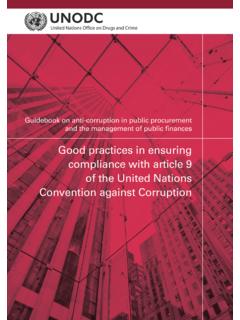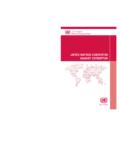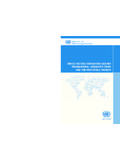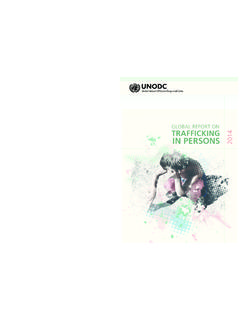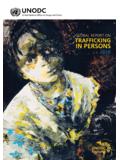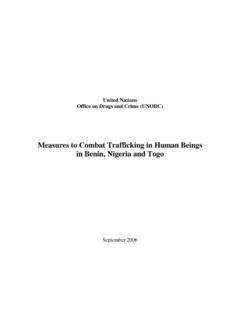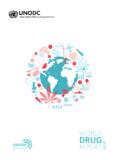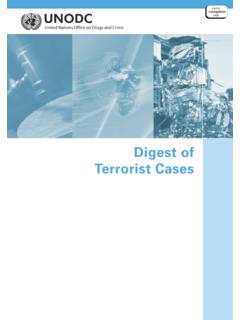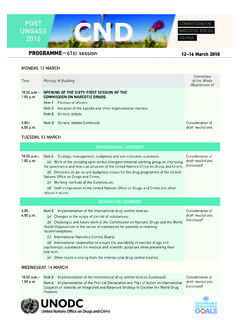Transcription of UNITED NATIONS CONVENTION AGAINST …
1 UNITED NATIONS CONVENTION AGAINSTTRANSNATIONAL ORGANIZED CRIME AND THE PROTOCOLS THERETOV ienna International Centre, PO Box 500, A 1400 Vienna, Austria Tel: +(43) (1) 26060-0, Fax: +(43) (1) 26060-5866, in Austria September 2004 1,900 UNITED NATIONSUNITED NATIONS OFFICE ON DRUGS AND CRIMEV iennaUNITED NATIONS CONVENTION AGAINSTTRANSNATIONAL ORGANIZED CRIMEAND THE PROTOCOLS THERETOUNITED NATIONSNew York, 2004iiiForewordWith the signing of the UNITED NATIONS CONVENTION AGAINST TransnationalOrganized Crime in Palermo, Italy, in December 2000, the international com-munity demonstrated the political will to answer a global challenge with aglobal response. If crime crosses borders, so must law enforcement. If the rule oflaw is undermined not only in one country, but in many, then those whodefend it cannot limit themselves to purely national means. If the enemies ofprogress and human rights seek to exploit the openness and opportunities ofglobalization for their purposes, then we must exploit those very same factors todefend human rights and defeat the forces of crime, corruption and traffickingin human of the starkest contrasts in our world today is the gulf that existsbetween the civil and the uncivil.
2 By civil I mean civilization: the accumulatedcenturies of learning that form our foundation for progress. By civil I alsomean tolerance: the pluralism and respect with which we accept and drawstrength from the world s diverse peoples. And finally, I mean civil society: thecitizens groups, businesses, unions, professors, journalists, political parties andothers who have an essential role to play in the running of any AGAINST these constructive forces, however, in ever greater numbersand with ever stronger weapons, are the forces of what I call uncivil society .They are terrorists, criminals, drug dealers, traffickers in people and others whoundo the good works of civil society. They take advantage of the open borders,free markets and technological advances that bring so many benefits to theworld s people. They thrive in countries with weak institutions, and they showno scruple about resorting to intimidation or violence.
3 Their ruthlessness is thevery antithesis of all we regard as civil. They are powerful, representing en-trenched interests and the clout of a global enterprise worth billions of dollars,but they are not Millennium Declaration adopted by the Heads of State meeting at theUnited NATIONS in September 2000 reaffirmed the principles underlying ourefforts and should serve to encourage all who struggle for the rule of law. TheDeclaration states that men and women have the right to live their lives andraise their children in dignity, free from hunger and from the fear of violence,oppression or injustice .At the Millennium Summit, world leaders proclaimed freedom from fearand from want as one of the essential values in the twenty-first century. Yetthe right to live in dignity, free from fear and want, is still denied to millionsivof people around the world.
4 It is denied to the child who is working as anindentured labourer in a sweatshop; to the father who must pay a bribe to getmedical care for his son or daughter; to the woman who is condemned to a lifeof forced believe the trafficking of persons, particularly women and children, forforced and exploitative labour, including for sexual exploitation, is one of themost egregious violations of human rights that the UNITED NATIONS now con-fronts. It is widespread and growing. It is rooted in social and economic condi-tions in the countries from which the victims come, facilitated by practices thatdiscriminate AGAINST women and driven by cruel indifference to human sufferingon the part of those who exploit the services that the victims are forced toprovide. The fate of these most vulnerable people in our world is an affront tohuman dignity and a challenge to every State, every people and every commu-nity.
5 I therefore urge the Member States to ratify not only the UNITED NationsConvention AGAINST transnational Organized Crime, but also the Protocol toPrevent, Suppress and Punish Trafficking in Persons, Especially Women andChildren, which can make a real difference in the struggle to eliminate thisreprehensible trade in human groups have wasted no time in embracing today s globalizedeconomy and the sophisticated technology that goes with it. But our efforts tocombat them have remained up to now very fragmented and our weaponsalmost obsolete. The CONVENTION gives us a new tool to address the scourge ofcrime as a global problem. With enhanced international cooperation, we canhave a real impact on the ability of international criminals to operate success-fully and can help citizens everywhere in their often bitter struggle for safety anddignity in their homes and signing of the CONVENTION in Palermo in December 2000 was a water-shed event in the reinforcement of our fight AGAINST organized crime.
6 I urge allStates to ratify the CONVENTION and the Protocols thereto at the earliest possibledate and to bring these instruments into force as a matter of A. AnnanSecretary-GeneralvContentsPageGener al Assembly resolution 55/25 of 15 November 2000 .. NATIONS CONVENTION AGAINST transnational Organized Crime . to Prevent, Suppress and Punish Trafficking in Persons,Especially Women and Children, supplementing the UNITED NationsConvention AGAINST transnational Organized Crime .. AGAINST the Smuggling of Migrants by Land, Sea and Air,supplementing the UNITED NATIONS CONVENTION AGAINST TransnationalOrganized Crime .. 53 General Assembly resolution 55/255 of 31 May 2001 .. 69 Annex. Protocol AGAINST the Illicit Manufacturing of and Trafficking inFirearms, Their parts and Components and Ammunition,supplementing the UNITED NATIONS CONVENTION againstTransnational Organized Crime.
7 711 General Assembly resolution 55/25of 15 November 2000 UNITED NATIONS CONVENTION againstTransnational Organized CrimeThe General Assembly,Recalling its resolution 53/111 of 9 December 1998, in which it decidedto establish an open-ended intergovernmental ad hoc committee for the purposeof elaborating a comprehensive international CONVENTION AGAINST transnationalorganized crime and of discussing the elaboration, as appropriate, of inter-national instruments addressing trafficking in women and children, combatingthe illicit manufacturing of and trafficking in firearms, their parts and compo-nents and ammunition, and illegal trafficking in and transporting of migrants,including by sea,Recalling also its resolution 54/126 of 17 December 1999, in which itrequested the Ad Hoc Committee on the Elaboration of a CONVENTION againstTransnational Organized Crime to continue its work, in accordance with reso-lutions 53/111 and 53/114 of 9 December 1998, and to intensify that work inorder to complete it in 2000,Recalling further its resolution 54/129 of 17 December 1999, in which itaccepted with appreciation the offer of the Government of Italy to host a high-level political signing conference in Palermo for the purpose of signing theUnited NATIONS CONVENTION AGAINST transnational Organized Crime (PalermoConvention)
8 And the protocols thereto, and requested the Secretary-General toschedule the conference for a period of up to one week before the end of theMillennium Assembly in 2000,Expressing its appreciation to the Government of Poland for submitting toit at its fifty-first session a first draft UNITED NATIONS CONVENTION againsttransnational organized crime1 and for hosting the meeting of the inter-sessionalopen-ended intergovernmental group of experts, established pursuant to resolu-tion 52/85 of 12 December 1997, on the elaboration of a preliminary draft of1 , possible comprehensive international CONVENTION AGAINST transnational orga-nized crime, held in Warsaw from 2 to 6 February 1998,Expressing its appreciation to the Government of Argentina for hosting theinformal preparatory meeting of the Ad Hoc Committee, held in Buenos Airesfrom 31 August to 4 September 1998,Expressing its appreciation to the Government of Thailand for hosting theAsia-Pacific Ministerial Seminar on Building Capacities for Fighting Trans-national Organized Crime, held in Bangkok on 20 and 21 March 2000,Deeply concerned by the negative economic and social implications relatedto organized criminal activities, and convinced of the urgent need to strengthencooperation to prevent and combat such activities more effectively at thenational, regional and international levels,Noting with deep concern the growing links between transnational organizedcrime and terrorist crimes, taking into account the Charter of the UnitedNations and the relevant resolutions of the General Assembly.
9 Determined to deny safe havens to those who engage in transnational orga-nized crime by prosecuting their crimes wherever they occur and by cooperatingat the international level,Strongly convinced that the UNITED NATIONS CONVENTION AGAINST Trans-national Organized Crime will constitute an effective tool and the necessarylegal framework for international cooperation in combating, inter alia, suchcriminal activities as money-laundering, corruption, illicit trafficking in en-dangered species of wild flora and fauna, offences AGAINST cultural heritage andthe growing links between transnational organized crime and terrorist crimes, note of the report of the Ad Hoc Committee on the Elaborationof a CONVENTION AGAINST transnational Organized Crime,2 which carried out itswork at the headquarters of the UNITED NATIONS Office for Drug Control andCrime Prevention in Vienna, and commends the Ad Hoc Committee for itswork; the UNITED NATIONS CONVENTION AGAINST transnational Organ-ized Crime and the Protocol to Prevent, Suppress and Punish Trafficking inPersons, Especially Women and Children, supplementing the UNITED NationsConvention AGAINST transnational Organized Crime, and the Protocol against2 Smuggling of Migrants by Land, Sea and Air, supplementing the UnitedNations CONVENTION AGAINST transnational Organized Crime annexed to thepresent resolution, and opens them for signature at the High-level PoliticalSigning Conference to be held in Palermo, Italy, from 12 to 15 December 2000in accordance with resolution 54/129.
10 The Secretary-General to prepare a comprehensive report onthe High-level Political Signing Conference to be held in Palermo in accordancewith resolution 54/129; that the Ad Hoc Committee has not yet completed its work onthe draft Protocol AGAINST the Illicit Manufacturing of and Trafficking in Fire-arms, Their Parts and Components and Ammunition, supplementing theUnited NATIONS CONVENTION AGAINST transnational Organized Crime; the Ad Hoc Committee to continue its work in relation tothis draft Protocol, in accordance with resolutions 53/111, 53/114 and 54/126,and to finalize such work as soon as possible; upon all States to recognize the links between transnational orga-nized criminal activities and acts of terrorism, taking into account the relevantGeneral Assembly resolutions, and to apply the UNITED NATIONS Conventionagainst transnational Organized Crime in combating all forms of criminalactivity, as provided therein; that the Ad Hoc Committee established by the GeneralAssembly in its resolution 51/210 of 17 December 1996, which is beginning itsdeliberations with a view to developing a comprehensive CONVENTION on inter-national terrorism, pursuant to resolution 54/110 of 9 December 1999, shouldtake into consideration the provisions of the UNITED NATIONS Conventionagainst transnational Organized Crime.
